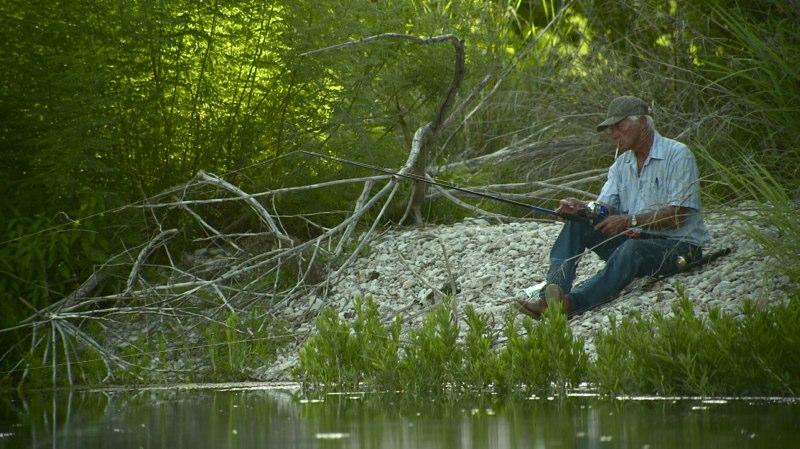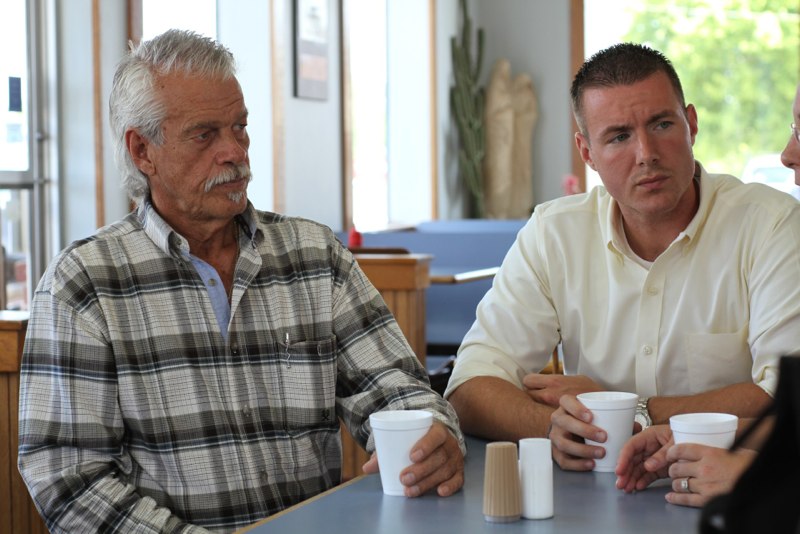We Went to War | reviews, news & interviews
We Went to War
We Went to War
British director follows up on celebrated 1970 Vietnam veterans documentary

In his 1970 television documentary for Granada, I Was a Soldier, British filmmaker Michael Grigsby was one of the first to look into the experience of US soldiers returning home from Vietnam. “Vietnam syndrome” may have been a few years away from any formal diagnosis, but Grigsby caught the mood of three young Texans – David, Dennis and Lamar – back from the conflict and struggling to re-engage with a society that has become alien to them.
Grigsby returned to the town of Brady and its Texas environs 40 years later, and the result is his new film We Went to War (co-directed with Rebeka Tolley). Though the town centre has seen closures over the years, little else seems to have changed, as a split-screen drive-around the same streets, then and now, shows. Lamar died in 2002, and we hear about the last years of his life through the words of his widow and daughter; David and Dennis are as quietly eloquent as before.
David breaks down when speaking of how he entered counselling only after 38 years
Grigsby allows his subject’s silences to resound as much as anything they say, along with the huge, empty landscapes that surround them; most frequently we hear their words in voiceover, while Jonas Mortensen’s camera tracks over wide open spaces, or drives the town's bungalow-lined roads. We’re left with an impression that it’s a lonely life here – not in the literal sense of lacking everyday company, but that it’s a place where surroundings dwarf human experience, and that these three were set apart, somehow made alone, by what they went through. And that, in a strange way, it's somehow been a healing loneliness.
Lamar’s nightmares continued until the end of his life, itself likely shortened by exposure to Agent Orange. “It’s like your worst nightmare comes at you all of a sudden, death looking at you in the face,” recalls Dennis. David breaks down when speaking of how he entered counselling only after 38 years, and comes up with the unforgettable phrase “pushing the hurt away” to describe what it’s been like living with those experiences (part of his peace, then and now, comes through fishing, main picture).
Putting this Vietnam experience into unavoidable perspective, Dennis talks with two more recent veterans, Jarod and Tish, from the conflict in Iraq, about the “rifts in life” that involvement in war brings (Dennis and Jarod, pictured below). “It boggles my mind and makes my heart cry,” Tish says. “You do your mission and come home, and you’re alone.” The quieter the film's voices ring out, the more haunting their insight seems.
 Grigsby has been making documentaries for more than 50 years, in a line that stretches right back to John Grierson and Free Cinema. The trust between subject and director is complete, fostered by lengthy research and rock solid empathy. By any standards his approach is slow, simply creating a space that the subjects are left free to fill, in their own time. At the end of one of the Texas screenings of the film, an audience member shouted out, “Why does it have to take another country to recognize our veterans?” Drawing out stories like this isn’t a matter of nationality, of course, but the achievement of the true documentarist.
Grigsby has been making documentaries for more than 50 years, in a line that stretches right back to John Grierson and Free Cinema. The trust between subject and director is complete, fostered by lengthy research and rock solid empathy. By any standards his approach is slow, simply creating a space that the subjects are left free to fill, in their own time. At the end of one of the Texas screenings of the film, an audience member shouted out, “Why does it have to take another country to recognize our veterans?” Drawing out stories like this isn’t a matter of nationality, of course, but the achievement of the true documentarist.
We Went to War is on limited release from Friday, including at the ICA, London, where it plays in a double bill with I Was a Soldier on Sunday March 31.
Watch the trailer for We Went to War
Add comment
The future of Arts Journalism
You can stop theartsdesk.com closing!
We urgently need financing to survive. Our fundraising drive has thus far raised £49,000 but we need to reach £100,000 or we will be forced to close. Please contribute here: https://gofund.me/c3f6033d
And if you can forward this information to anyone who might assist, we’d be grateful.

Subscribe to theartsdesk.com
Thank you for continuing to read our work on theartsdesk.com. For unlimited access to every article in its entirety, including our archive of more than 15,000 pieces, we're asking for £5 per month or £40 per year. We feel it's a very good deal, and hope you do too.
To take a subscription now simply click here.
And if you're looking for that extra gift for a friend or family member, why not treat them to a theartsdesk.com gift subscription?
more Film
 London Film Festival 2025 - crime, punishment, pop stars and shrinks
Daniel Craig investigates, Jodie Foster speaks French and Colin Farrell has a gambling habit
London Film Festival 2025 - crime, punishment, pop stars and shrinks
Daniel Craig investigates, Jodie Foster speaks French and Colin Farrell has a gambling habit
 I Swear review - taking stock of Tourette's
A sharp and moving tale of cuss-words and tics
I Swear review - taking stock of Tourette's
A sharp and moving tale of cuss-words and tics
 A House of Dynamite review - the final countdown
Kathryn Bigelow's cautionary tale sets the nuclear clock ticking again
A House of Dynamite review - the final countdown
Kathryn Bigelow's cautionary tale sets the nuclear clock ticking again
 theartsdesk Q&A: Idris Elba on playing a US President faced with a missile crisis in 'A House of Dynamite'
The star talks about Presidential decision-making when millions of lives are imperilled
theartsdesk Q&A: Idris Elba on playing a US President faced with a missile crisis in 'A House of Dynamite'
The star talks about Presidential decision-making when millions of lives are imperilled
 Urchin review - superb homeless drama
Frank Dillane gives a star-making turn in Harris Dickinson’s impressive directorial debut
Urchin review - superb homeless drama
Frank Dillane gives a star-making turn in Harris Dickinson’s impressive directorial debut
 Mr Blake at Your Service review - John Malkovich in unlikely role as an English butler
Weird comedy directed by novelist Gilles Legardinier
Mr Blake at Your Service review - John Malkovich in unlikely role as an English butler
Weird comedy directed by novelist Gilles Legardinier
 Don't Let's Go to the Dogs Tonight review - vivid adaptation of a memoir about a Rhodesian childhood
Embeth Davidtz delivers an impressive directing debut and an exceptional child star
Don't Let's Go to the Dogs Tonight review - vivid adaptation of a memoir about a Rhodesian childhood
Embeth Davidtz delivers an impressive directing debut and an exceptional child star
 One Battle After Another review - Paul Thomas Anderson satirises America's culture wars
Leonardo DiCaprio, Teyana Taylor, and Sean Penn star in a rollercoasting political thriller
One Battle After Another review - Paul Thomas Anderson satirises America's culture wars
Leonardo DiCaprio, Teyana Taylor, and Sean Penn star in a rollercoasting political thriller
 Steve review - educator in crisis
Cillian Murphy excels as a troubled headmaster working with delinquent boys
Steve review - educator in crisis
Cillian Murphy excels as a troubled headmaster working with delinquent boys
 Can I get a Witness? review - time to die before you get old
Ann Marie Fleming directs Sandra Oh in dystopian fantasy that fails to ignite
Can I get a Witness? review - time to die before you get old
Ann Marie Fleming directs Sandra Oh in dystopian fantasy that fails to ignite
 Happyend review - the kids are never alright
In this futuristic blackboard jungle everything is a bit too manicured
Happyend review - the kids are never alright
In this futuristic blackboard jungle everything is a bit too manicured

Comments
Sad news indeed. Only just
Sad news indeed. Only just learnt that Michael Grigsby died on March 12, aged 76. It may give an extra elegaic quality to 'We Went to War', but the director was as active as ever taking the film around festival and other audiences, speaking with commitment of his craft. A craft which, based around taking time to allow the stories of others, often 'everyday' lives, to unfold, seems increasingly out of sync with the way documentaries are made (or rather, not made) today. Looking around earlier this year to see if anything of his earlier work, from more than 50 years of filmmaking, was available, I was shocked to find that nothing was. We can only hope that a retrospective collection may in preparation.
the director died? it's